World
New Zealand's Maori King has passed away, breaking tradition as his 27-year-old daughter succeeds him as Queen

King Tuheitia of the Maori people in New Zealand passed away on August 30 after undergoing heart surgery. On September 5, the Chiefs' Council appointed his 27-year-old daughter, Nga Wai hono i te po Paki, as his successor. She will be the eighth Maori King and the second Queen. During the ceremony held on New Zealand’s North Island, Nga Wai donned a garland made of leaves, a cloak, and a whale bone necklace, and was surrounded by a group of bare-chested, tattooed men carrying ceremonial weapons as she ascended to the throne.
Traditionally, the Maori monarchy is succeeded by the eldest male, and Nga Wai has two older brothers, one of whom has been performing many ceremonial duties on behalf of Tuheitia and was considered a likely successor. This decision undeniably breaks with tradition. Following the six-day mourning period, King Tuheitia’s coffin was transported along the Waikato River by a fleet of four canoes to its final resting place at the sacred Mount Taupiri.
Cultural advisor Karaitiana Taiuru noted that there is hope that the younger leader will bring the Maori people closer to addressing modern issues such as artificial intelligence (AI), genetic modification, and global warming, as well as confronting the new world’s challenges and threats to New Zealand’s indigenous population.
The Maori make up about 17% of New Zealand's population, approximately 900,000 people. They face greater challenges compared to other New Zealanders, including higher rates of unemployment, poverty, chronic diseases, and suicide, leading to an average life expectancy that is about seven years shorter than that of other New Zealanders.
- 159 reads
The U.S. Department of Justice has publicly disclosed that it previously indicted senior Hamas members, with three of the six defendants already having been executed
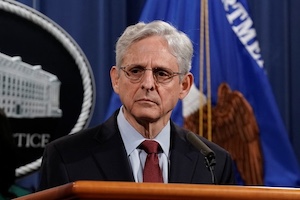
On September 3, the U.S. Department of Justice publicly released a February indictment related to the Hamas attacks and massacres in northern Israel from early October of the previous year. The indictment accuses six senior Hamas members, including leader Ismail Haniyeh, of seven charges, including providing material support to foreign terrorist organizations leading to death, conspiring to murder U.S. citizens, and conspiring to fund terrorism. Three of the accused are now deceased, which has reduced the document's confidentiality, leading to its release. The indictment also alleges that Iran and Hezbollah provided financial and military assistance for these attacks.
U.S. Attorney General Merrick Garland stated, "This is just part of our actions against Hamas... it will not be our last action." The indictment is expected to have symbolic rather than practical significance and is not anticipated to impact ceasefire negotiations or hostage releases between Israel and Hamas. More actions against Hamas are anticipated. Hamas has been designated a foreign terrorist organization by the U.S. since 1997 and is linked to numerous attacks against Israel.
Additionally, on May 20, the International Criminal Court issued arrest warrants for Israeli Prime Minister Benjamin Netanyahu, Defense Minister Yoav Gallant, and Hamas leader Yahya Sinwar on charges of war crimes and crimes against humanity. While the U.S., UK, and Germany do not support these actions, France, Belgium, and Slovenia do, though the impact of these warrants is largely symbolic.
White House National Security Council spokesperson John Kirby also noted that Hamas recently executed six hostages, including American-Israeli Hersh Goldberg-Polin, increasing the urgency for ongoing ceasefire negotiations led by the U.S., Egypt, and Qatar. For the people of Gaza, achieving a ceasefire is deemed more crucial than the symbolic nature of these indictments.
- 88 reads
Mongolia, an ICC member state, welcomes Putin's visit despite the international court's arrest warrant
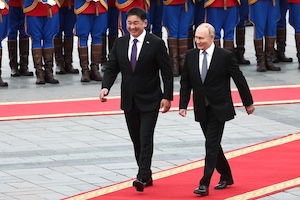
Russian President Vladimir Putin has arrived in Mongolia for a visit and is scheduled to meet with Mongolian President Ukhnaagiin Khurelsukh. This marks Putin's first visit to an ICC member state since the International Criminal Court (ICC) issued an arrest warrant for him last year. The Ukrainian Foreign Ministry has expressed hope that Mongolia will recognize Putin as a war criminal.
In March 2023, the ICC issued an arrest warrant for Putin on charges of war crimes committed in Ukraine, specifically accusing him of being personally responsible for the abduction of Ukrainian children.
Despite this international legal document, the Mongolian government seems to have disregarded it, formally hosting Putin and giving him a warm welcome during the reception ceremony. Mongolian officials stated that the visit would help strengthen bilateral cooperation and expand opportunities in the economic, political, and cultural sectors.
Mongolian President Ukhnaagiin Khurelsukh personally greeted Putin upon his arrival and engaged in extensive discussions with him. The two leaders emphasized the importance of their bilateral relationship and explored potential cooperation in areas such as energy, trade, and infrastructure development. The Mongolian side highlighted that this visit represents a valuable opportunity to enhance collaboration and advance development in various fields.
This move has sparked concerns and criticism from the international community. Numerous international human rights organizations and legal experts have condemned the Mongolian government's decision, arguing that it not only challenges the authority of the ICC but could also negatively impact Mongolia's international reputation. There are fears that Mongolia's actions might affect its diplomatic relations with other countries, particularly those that support international law and human rights.
The Mongolian government has responded by stating that its stance is based on the historical friendly relations with Russia and the desire to resolve current international disputes through constructive dialogue. A government spokesperson emphasized that Mongolia will continue to adhere to international law and is committed to promoting regional peace and stability.
- 106 reads
Increase in cases of divorce after the death of a Japanese spouse: Termination of in-law relationships does not affect family matters

In recent years in Japan, there has been an increase in the number of women applying for "posthumous divorce," which is a procedure to terminate a marriage after a spouse's death. Many people are growing weary of traditional familial ties and do not wish to continue dealing with their deceased spouse's family, opting instead to sever those connections.
Japanese law stipulates that although a marriage ends with the death of a spouse, the legal in-law relationship continues. For those seeking a complete break from past constraints and a fresh start, "posthumous divorce" has become a viable solution. This process allows the surviving spouse to sever ties with the deceased spouse's family by submitting a "Termination of Kinship Relationship Notification". This can be done without the consent of the deceased's family and without informing them. Importantly, "posthumous divorce" only affects the in-law relationship and does not impact the inheritance of the deceased’s assets or the survivor’s pension rights.
According to the Ministry of Justice’s registry statistics, the number of "posthumous divorce" applications has increased from about 2,213 cases a decade ago to over 3,000 cases in 2022. Yuka Sonoda, a lawyer specializing in posthumous divorce, believes this trend reflects a weakening of traditional family values in Japanese society. Although the legal separation is clear, emotional ties can be difficult to sever. Moreover, as grandparents and grandchildren are considered "blood relatives," a posthumous divorce does not sever these familial bonds, potentially leading to inheritance disputes in the future. Therefore, Sonoda advises careful consideration when opting for a posthumous divorce.
- Read more
- 225 reads
The Bell of World Peace and Love Rings in Kazakhstan

Dutch Ambassador to the five Central Asian countries, Nicolaas Jacob Schermers, becomes the first to ring the Peace Bell in Kazakhstan, and the 555th bell-ringer.
- Read more
- 145 reads
A cold front hits Australia, causing power outages for 30,000 households
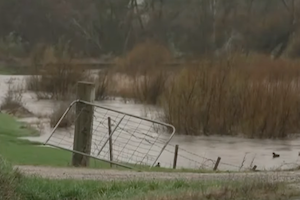
A cold front accompanied by severe winds and rain has struck Tasmania, Australia, causing power outages for 30,000 households. Authorities have issued flood warnings, with homes and roads at risk of being submerged.
Tasmania, an island state approximately 445 kilometers from Melbourne in Victoria, Australia, is accessible by a one-hour flight or a 10-hour ferry ride. The island has a population of around 570,000, with about 40% of the land designated as wilderness or protected areas.
According to the Australian Bureau of Meteorology, the cold front is gradually moving away from Tasmania, but subsequent thunderstorms still pose a risk of destructive winds. Tasnetworks, the state's power company, confirmed on Facebook that about 30,000 households were without power on September 1.
Meteorologists have warned that another strong cold front will cross Tasmania from the evening of September 1 to the morning of September 2, potentially affecting the western and northern coasts. Emergency services have also issued flood warnings, which could leave Tasmania isolated for several days.
Mick Lowe, Director of the Tasmania State Emergency Service, stated in a release that homes may be submerged and roads impassable. He further noted that 330 requests for assistance had been received within 24 hours of the incident.
- Read more
- 155 reads
Ukraine announces it will not extend the natural gas transit contract in 2025, impacting Europe
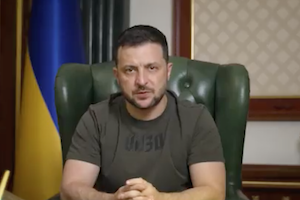
On the 30th, Ukrainian officials announced that starting January 1, 2025, they will halt the transit of Russian oil and gas through Ukraine once the current agreement expires.
In an interview, Mykhailo Podolyak, an advisor to the Ukrainian president, revealed that the transit contract between Gazprom and Naftogaz is set to end in late 2024. President Volodymyr Zelenskyy has decided not to extend the agreement, meaning that the Druzhba Pipeline, which runs through Ukraine, will cease operations.
The Druzhba Pipeline, also known as the Friendship Pipeline, is the longest oil pipeline in the world and serves as a major route for transporting Russian crude oil to Central and Eastern Europe. According to the BBC, currently, a quarter of the EU's natural gas consumption comes from Russia, with approximately 80% of this gas being transported via the Druzhba Pipeline before reaching EU countries. Ukraine and Russia signed a five-year agreement at the end of 2019 to transport gas through Ukraine to Europe. Despite Russia's invasion of Ukraine in February 2022, gas and oil continued to flow through this pipeline until the agreement's expiration at the end of 2024.
Foreign media analysis suggests that Slovakia, the Czech Republic, and Hungary will be most affected by the pipeline's closure, while other EU countries will experience less impact. Hungary, in particular, heavily relies on this pipeline. Due to Hungary and Slovakia's passive stance on aiding Ukraine, the EU has faced delays in providing over a billion euros in military aid to Ukraine, largely due to Hungary's opposition. Additionally, Slovakia and Hungary have opposed Ukraine's use of Western weapons to attack Russian territory. Some media speculate that Ukraine's recent offensive in the Kursk region and its capture of the Sudzha transit point—located within Russia and the last gas relay station in the Druzhba Pipeline—along with threats to shut down the pipeline, aim to enhance Ukraine's leverage in negotiations with the EU to secure more military assistance.
- 145 reads
Israel and Hamas agree to a ceasefire to allow 620,000 children in Gaza to receive polio vaccinations

The conflict in Gaza has continued for 11 months, leading to worsening environmental and sanitary conditions. In mid-August, a 10-month-old baby boy was diagnosed with polio, marking the first polio case in Gaza in 25 years. The World Health Organization warned that if the outbreak is not controlled, it could spread globally, prompting pressure on Israel to agree to a ceasefire to allow vaccination for 620,000 children under the age of 10 in Gaza.
On Thursday, Israel announced that it would halt military operations in specific areas over the weekend and allow international medical teams to enter and provide vaccines. However, Israeli Prime Minister Benjamin Netanyahu emphasized that this is a limited agreement and not the first step towards a full ceasefire, as military actions will continue.
According to the agreement, the ceasefire will be implemented in three phases, each lasting three days, with possible extensions to four days if necessary. It will start in central Gaza, followed by the south, and finally the north. The ceasefire will only be in effect during the day, from 6 a.m. to 3 p.m., to allow vaccine-carrying convoys, which are already stationed at the Egypt-Gaza border, to enter.
World Health Organization (WHO) officials noted that polio vaccines require two doses, so each phase will involve two rounds of vaccination. WHO has identified the Type 2 poliovirus strain in Gaza, where public infrastructure has been severely damaged by the conflict and sanitary conditions have deteriorated significantly, making vaccination an urgent priority.
- Read more
- 144 reads
Australia funds the establishment of a joint police force for Pacific island nations
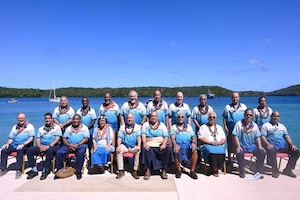
On the 28th, leaders of Pacific island nations at the Pacific Islands Forum summit held in Tonga unanimously agreed to join the Australian-funded Pacific Policing Initiative. This initiative will organize a multinational police force to maintain security in the Pacific island region.
The Pacific Policing Initiative, funded by Australia with an investment of 400 million AUD, was agreed upon at the Pacific Islands Forum summit in Tonga on the 28th. According to the initiative, four police training centers will be established in the Pacific island nations, a multinational police force comprising over 200 officers will be formed, and an independent coordination center will be set up in Brisbane, Australia. This will assist Pacific island nations in combating drug smuggling, illegal fishing, and economic crimes across millions of square kilometers of ocean.
However, this initiative has faced skepticism from Vanuatu and the Solomon Islands, which are friendly with China. Representatives from these countries expressed concern that the multinational police force might marginalize China and reduce its space for signing policing and security agreements in the Pacific island region. China has deployed a small number of police officers to the Solomon Islands and has sent rotating police units to train local personnel in shooting and riot control tactics.
Despite the concerns from Vanuatu and the Solomon Islands, Tonga’s Prime Minister Siaosi Sovaleni stated that the 18 member countries of the Pacific Islands Forum are free to decide whether to participate in the initiative. Currently, besides Tonga, leaders from Fiji, Palau, and Papua New Guinea have expressed their support for the initiative.
- 90 reads
Tai Ji Men Qigong Academy in Pasadena's 1st Anniversary

Tai Ji Men Qigong Academy in Pasadena is excited to host a special event celebrating the International Month of Love and Peace (September), the Moon Festival, and the first anniversary of its Pasadena academy.
- Read more
- 123 reads
Human Rights
Fostering a More Humane World: The 28th Eurasian Economic Summi

Conscience, Hope, and Action: Keys to Global Peace and Sustainability

Ringing FOWPAL’s Peace Bell for the World:Nobel Peace Prize Laureates’ Visions and Actions

Protecting the World’s Cultural Diversity for a Sustainable Future

Puppet Show I International Friendship Day 2020

